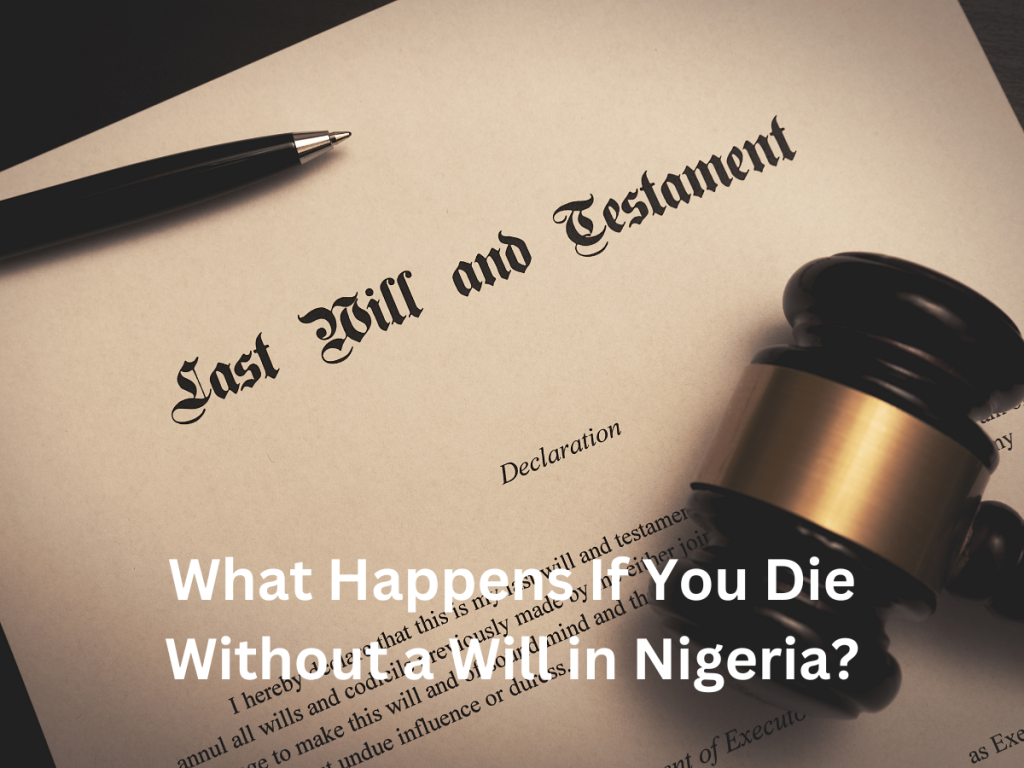Imagine working hard all your life to build wealth, provide for your family, and secure a comfortable future—only for your loved ones to be thrown into legal battles over your assets after you pass away. Unfortunately, this is the reality for many Nigerians who die without a will. When this happens, their estates are distributed according to intestacy laws, often leading to disputes, delays, and unintended consequences. In this article, we will explore what happens when a person dies without a will in Nigeria, the risks involved, and how you can take steps to protect your assets and loved ones.
What Is Intestacy?
Intestacy occurs when a person dies without a valid will. In such cases, the distribution of their assets is governed by the Nigerian laws of intestacy, namely:
- The Administration of Estates Laws (varies by state)
- The Wills Act 1837 (where applicable)
- Customary and Islamic Laws (where applicable)
Usually, the applicable law is determined by the deceased’s personal circumstances, including their marital status, place of abode, religion, and the location of their assets.
How Are Assets Distributed When There Is No Will?
When someone dies without a will (intestate), their assets will be distributed based on the relevant law of intestacy, which may not align with their personal wishes. Here’s how it typically works:
Married with Children
The surviving spouse and children usually inherit the estate.
Married Without Children
The spouse may inherit everything or share it with other family members, including extended family members who may also have claims according to customary or religious laws.
Single Without Children
The estate may pass to parents, siblings, or extended family members. Where no relatives are found, the government may take possession of the assets.
The Risks of Dying Without a Will
Without a valid will, your assets can be exposed to any or all of the following risks:
- Family Disputes: Relatives may fight over your assets, leading to prolonged legal battles.
- Delays & Legal Costs: The probate process can take years and incur significant expenses.
- Unintended Beneficiaries: Your assets may end up in the hands of people you never intended to inherit them.
- Government Intervention: In extreme cases, unclaimed assets may go to the government.
How to Prevent These Issues
The best way to avoid these problems is to draft a legally valid will, and here is how to start:
- List all your assets. Include real estate, bank accounts, investments, and personal valuables.
- Appoint an executor. Ensure you choose a trusted person to carry out your wishes.
- Decide on your beneficiaries. Specify who gets what and in what proportion.
- Consult an estate planning lawyer who will help you ensure your will is legally valid and aligns with your wishes.
FAQs & Common Misconceptions
- Is writing a will expensive?
No. While there is a cost, it is far less than the legal fees and disputes that can arise without one. - Can I draft my own will?
Yes, but it’s best to have a lawyer review it to avoid mistakes that could render it invalid. - What if I have a small estate?
No matter how little or much you own, a will ensures that your assets go to the people you want to have them.
Don’t leave your loved ones in legal chaos. Protect your family and assets by creating a will today. If you need help drafting your will, schedule a consultation now.


Pingback: MyBlog
Pingback: buying enclomiphene american express
Pingback: kamagra en ligne le lendemain
Pingback: ordering androxal generic when will be available
Pingback: order flexeril cyclobenzaprine next day
Pingback: buy dutasteride generic is it safe
Pingback: buy gabapentin australia online no prescription
Pingback: how to buy fildena generic in us
Pingback: buy itraconazole generic in us
Pingback: buy avodart generic india
Pingback: buy cheap staxyn cheap no prescription
Pingback: purchase rifaximin cheap prescription
Pingback: how to order xifaxan cheap new zealand
Pingback: kamagra bez lékařského předpisu nebo lékaře